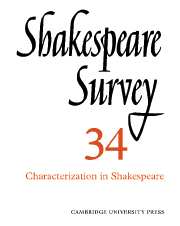Book contents
- Frontmatter
- Shakespeare’s Open Secret
- The Emergence of Character Criticism, 1774–1800
- Society and the Individual in Shakespeare’s Conception of Character
- Realistic Convention and Conventional Realism in Shakespeare
- On Expectation and Surprise: Shakespeare’s Construction of Character
- Shakespeare and the Ventriloquists
- The Rhetoric of Character Construction: Othello
- Characterizing Coriolanus
- The Ironic Reading of The Rape of Lucrece and the Problem of External Evidence
- The Unity of Romeo and Juliet
- No Abuse: The Prince and Falstaff in the Tavern Scenes of Henry IV
- Twelfth Night: The Experience of the Audience
- Plays and Playing in Twelfth Night
- Sceptical Visions: Shakespeare’s Tragedies and Jonson’s Comedies
- Shakespeare in Performance, 1980
- The Year's Contributions to Shakespearian Study 1 Critical Studies
- 2 Shakespeare’s Life, Times and Stage
- 3 Textual Studies
- Index
- Plate Section
Characterizing Coriolanus
Published online by Cambridge University Press: 28 March 2007
- Frontmatter
- Shakespeare’s Open Secret
- The Emergence of Character Criticism, 1774–1800
- Society and the Individual in Shakespeare’s Conception of Character
- Realistic Convention and Conventional Realism in Shakespeare
- On Expectation and Surprise: Shakespeare’s Construction of Character
- Shakespeare and the Ventriloquists
- The Rhetoric of Character Construction: Othello
- Characterizing Coriolanus
- The Ironic Reading of The Rape of Lucrece and the Problem of External Evidence
- The Unity of Romeo and Juliet
- No Abuse: The Prince and Falstaff in the Tavern Scenes of Henry IV
- Twelfth Night: The Experience of the Audience
- Plays and Playing in Twelfth Night
- Sceptical Visions: Shakespeare’s Tragedies and Jonson’s Comedies
- Shakespeare in Performance, 1980
- The Year's Contributions to Shakespearian Study 1 Critical Studies
- 2 Shakespeare’s Life, Times and Stage
- 3 Textual Studies
- Index
- Plate Section
Summary
The trouble with characterization is that we think we know what character is, or rather we think we know where it is and what kind of discourse best describes it. We think, or at least we generally speak as if we think, that it is to be found inside people, and we answer questions about character with summaries of inner qualities. This is a reasonable procedure and, it should be stressed, not a recent one. Nevertheless, it is true that in the past 150 years or so the description has tended more and more to stress the problematical and the psychological; character is seen as elusive, a subject for puzzle and argument, depending on the difficult and never entirely satisfactory attempt to chart the way someone’s mind works. And debate about dramatic character is likely to turn on whether it is reasonable to expect this kind of novelistic presentation of character from plays, especially plays written before the nineteenth century.
It is at this point that the discussion of character in drama becomes dangerously tangled, through the operation of hidden assumptions. For the implication in the typical debate 1 have described is that the psychological discourse of novels and novelizing psychology is the most accurate form for describing character in what we helplessly refer to as real life. But does our experience of other people correspond more to the helpful summaries of a novel or to the un-narratized encounters of a play?
- Type
- Chapter
- Information
- Shakespeare Survey , pp. 73 - 84Publisher: Cambridge University PressPrint publication year: 1982

